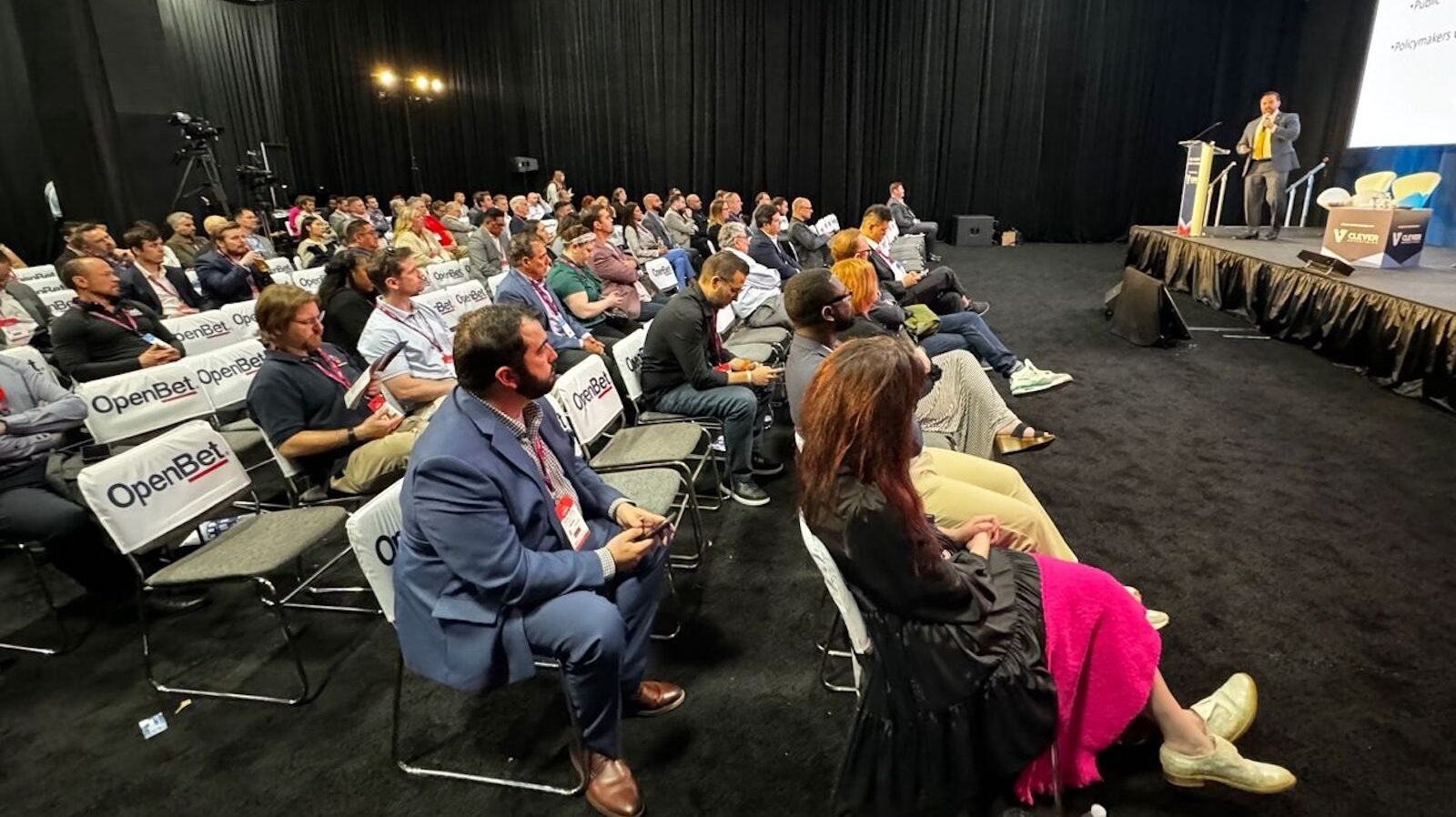Six Ideas For How Online Casino Proponents Can Get New Legislation Over The Finish Line
After 2025, expectations for expansion get rosier. In the meantime, the focus turns to what can be done to make growth happen.
6 min

Online casino expansion was a popular topic among industry insiders at last week’s SBC Summit North America conference. But optimism about immediate hopes for that expansion was harder to find than an open seat near the lunch buffet.
There are currently seven states with operational, regulated iCasino platfroms. One particular panel of five experts was asked at the conclusion of their conversation to predict how many states will have regulated iCasino by the end of 2025.
The answers: eight, seven, eight, seven, and seven.
In other words, the glass-half-full outlook says one more state will join the party in the next year-and-a-half. The glass-half-empty outlook is … well, completely empty.
But if we look beyond 2025, the expectations get rosier, with multiple panelists predicting the number will reach nine in 2026 and keep growing from there.
And in the meantime, the focus turns to what can be done to make that growth happen. To that end, six notable suggestions were floated over the course of a few different SBC Summit panels that Casino Reports observed.
1. Educate lawmakers about offshore iCasinos
FanDuel Head of State Government Relations Cesar Fernandez cited a key statistic for legislators hesitant to pass iCasino bills to know: “The American Gaming Association suggests,” Fernandez said, “that $370 billion is wagered illegally each year at offshore sites for online casino.
“It is already prevalent in your state. [If you regulate it] you’re making sure there are consumer protections in place.”
Elizabeth Suever, Bally’s Corporation’s vice president of government relations, lives in Rhode Island, the latest state to launch iCasino. She shared tales of actually taking the time to sit one-on-one with lawmakers and demonstrate for them how online casinos work and what it looks like.
“Lawmakers just aren’t as familiar with the product [as they are with sports betting]. They aren’t as familiar with the scale and scope of offshore gambling in iCasino,” Suever said.
“I personally went through and did person-by-person, legislator-by-legislator education,” Suever continued, explaining how she literally showed politicians the apps and how responsible gambling protections work while spelling out that such protections don’t exist with offshores. “A lot of lawmakers don’t understand what we’re talking about when we talk about iGaming. So, we need to go through that education piece. [We need to tell them] all this money is going offshore, you could do all this good for your constituents, and you’re not doing that.”
Brandt Iden, a former state representative in Michigan who is now the VP of government affairs for Fanatics Betting and Gaming, noted along related lines that, in the much more highly publicized world of sports betting, communicators in the industry need to apply the proper angles to education on recent scandals. For example, a regulated industry is to thank for NBA player Jontay Porter’s wagering coming to light, while Shohei Ohtani’s interpreter got into a mess in the unregulated industry.
“From an industry perspective, we need to tell our story better,” Iden said.
2. Emphasize the added tax revenue
When Shawn Fluharty, the president of the National Council of Legislators from Gaming States, successfully led the charge to pass iGaming in West Virginia as the minority whip in the House of Delegates, he said he emphasized to his colleagues that “it’s not just that you’re raising money — it’s where the money goes.” In other words, he recommends spelling out the good the tax revenue can do.
Fluharty added that if you present it to lawmakers or the voting public in a state that needs additional funds as a choice between raising people’s taxes or passing iGaming, “they’ll ask to pass iGaming every time.”
Suever noted, “Federal funds are drying up for a lot of states. There’s going to be more pointed need for those those funds.”
And the potential funds are substantial. Anyone who’s seen the tax revenue generation from online casino compared to online sports betting in states like Pennsylvania, New Jersey, and Michigan realizes this.
“A player who plays online casino and online sports betting is worth 14 times more to the business than one who only does sports betting,” said Adam Glass, director of B2B services for Rush Street Interactive. “It is revenue generation to the state, to the operators — but in a responsible way.”
3. iCasino has certain RG advantages over land-based
This is, undoubtedly, a two-sided issue. Concerns over putting the cliched “casino in every pocket” and the potentially addictive nature of having slot machines and table games literally at a person’s fingertips are valid. There are some people who can gamble responsibly on the occasional brick-and-mortar casino visit but lose control if presented with the opportunity to gamble any time they want.
A key counterpoint, however, was raised in favor of online gaming.
“From a responsible gambling standpoint,” said betParx Senior Director of iGaming Tim Cogswell, “online, we know every player who walks in the door.”
Quincy Raven, VP, North America for NeoGames/Aristocrat, echoed Cogswell’s point: “At the casino level, it’s effectively carded play and uncarded play. Online, it’s all carded play.”
Again, the challenge for the industry is to make legislators understand this distinction. (And, of course, to hammer home the offshore issue — the reality that people already have the opportunity to risk addiction to casino games whenever they want regardless of which state they live in.)
4. Communicate the cannibalization data
There’s no dirtier word among iCasino advocates these days than “cannibalization,” as the debate back and forth has become a major weapon against legalization.
“We need to operate on a baseline set of facts to cut through the noise,” said FanDuel’s Fernandez. “The fact is, since online casino came to New Jersey, brick-and-mortar revenue is up. Pennsylvania just reported its best month in brick-and-mortar revenue — that’s an iGaming state.”
Glass added that Rush Street’s data shows “the retail revenues are growing alongside online revenues, coming out of COVID. Studies are what they are, but we’re very confident in being additive to the ecosystem and not taking away from what the retail is doing.”
Cogswell put some numbers behind that. “In the case of Pennsylvania, if you compared January 2019 to January 2024, you’ve seen about a 10% increase on the retail side. Online has led to between a 50-70% increase to the total pie.”
Age demographics are key to the cannibalization conversation. NeoGames/Aristocrat executive Raven pointed out that the core demos of land-based casino players skew older, and on the online side, “We’re bringing younger players in. I think online expands competition. Competition can be scary — but it’s not cannibalization. It’s straight competition.”
Erik Nyman, president of Americas for EveryMatrix, said along similar lines, “Cannibalization probably only happens within about the 40-60-year-old age span.”
Catie Di Stefano, the director of community marketing for onlinegamblers.com, proposed an interesting idea that could help combat the cannibalization narrative. Di Stefano represents the younger demo at age 32, and she said prefers to do most of her gambling online, but goes to land-based casinos to eat, see shows, and so forth.
She advocated for more promotions crossing over between the two. For example, she suggested a program where wagering a certain amount at an online casino unlocks discounted show tickets or a free appetizer at a casino restaurant.
5. Push the job creation angle
We hear frequently from the anti-iGaming voices that legalization cannibalizes retail revenue and in turn will lead to B&M job loss. But what if the exact opposite is true?
“Something that may not be touched on enough is job creation,” said RSI’s Glass. “If iGaming were to come to New York, the state could become a hub of job creation, from all the jobs created to support the iGaming infrastructure.”
Whether the iCasino job creation would exceed the land-based job loss is a sub-debate of the cannibalization issue that hasn’t been definitively resolved. But there’s no question that iCasino legalization creates jobs. From tech support, to live-dealer studio staff, and beyond, Glass is right to point to the potential for new opportunities in each state that launches.
6. Wait for the shift to younger lawmakers
OK, this isn’t so much a strategy for iCasino advocates; it’s more of a back-up planning eventuality.
Fluharty suggested that getting lawmakers in place who understand technology better than the current crop of state legislators will go a long way toward helping iGaming bills advance. Over time, today’s older lawmakers will be phased out, and younger representatives will take their place.
This is not a quick fix. This is a case of playing the long game.
For what it’s worth, Iden said that gaming companies do not actively recruit legislative candidates.
“Finding candidates interested in the industry would be great!” he said with a smile. “But this is not a high-priority item in politics.”
Speaking on a panel focused on online lottery, GLI Vice President of Global Lottery Solutions Angela Wong acknowledged the realities of the changing times and how the gaming industry needs to change with them.
“You have technology and the market expectations moving at this rapid speed of light, and we are in an age where society has moved toward your mobile phone,” Wong said. “We are being driven by consumer expectations.”
Even though few people expect online casino legislation to leap forward this year or next, there is urgency because of the growing and assorted forms of competition, from iLottery to sweepstakes/social gaming to those aforementioned offshore operators.
“We as an industry, we need to move faster on regulation,” EveryMatrix exec Nyman said. “We need to accept that the market is changing. Sweepstakes will grow. We need to take action, and support each other, and build a healthy business moving forward.”






